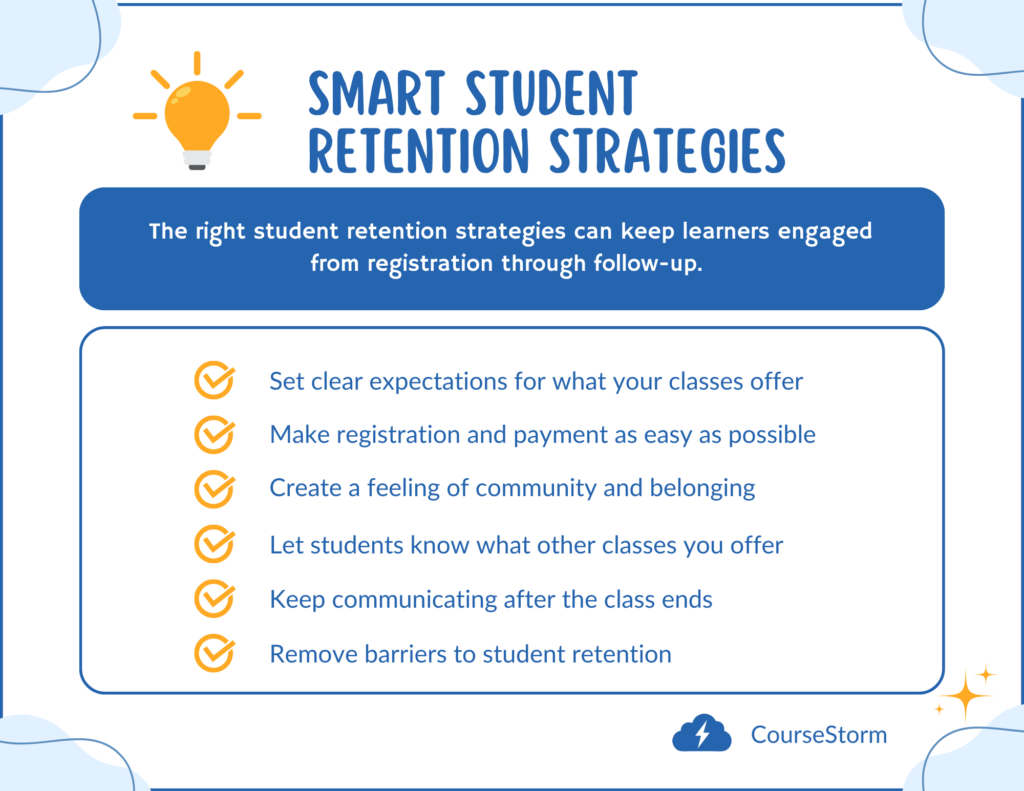Best Practices
Grow Your Program
How To's
Smart Student Retention Strategies to Keep Learners Coming Back to Your Classes

Keeping the customers you have is easier than attracting new ones. People who have previously enrolled in your classes already know and trust you. Offering high-quality courses is a good start, but this alone is not enough to create student loyalty. You also need smart student retention strategies to keep learners — and their friends and families — coming back for more.
It all comes down to each person’s experience with your organization. The right student retention strategies can keep them engaged from registration through follow-up. You want to make it as easy as possible for someone to enroll in your program. Then, offer support and a sense of community to keep them coming back.
We’re sharing some useful student retention strategies we’ve discovered over years of helping learning experience providers like you.
Through our years helping learning experience providers register and retain students, we’ve discovered some useful student retention strategies. Now we’re sharing them with you.
But first, we need to make an important point: every program needs to think about student loyalty, even if you offer courses learners are unlikely to repeat.
Student Retention Strategies Matter, Even If You Offer One-Off Courses
When you provide learning experiences, it’s not always obvious why student loyalty is important. You might be teaching professional development courses that students take only once in their career. Maybe you offer a retirement planning class, and people only plan for retirement once. This can make it feel like student retention strategies aren’t necessary for you.
Retention is about more than repeat business. It’s also about creating a community of people who will happily recommend you to others.
However, even programs that offer one-off classes can benefit from thinking about student loyalty. Retention is about more than repeat business, it’s also about building a community of people who will happily recommend you to friends, family, and coworkers.
If you have done the work of creating a high-quality experience, students are more likely to recommend your program. Increase the odds even more by putting smart student retention strategies in place.

6 Student Retention Strategies to Apply Today
1. Set Clear Expectations
Some surprises are good. Others, not so much. Offering a better learning experience than students expected is a good surprise. In general, though, students should know what to expect when they enroll in your classes.
Tell them upfront about any prerequisites, the expected time commitment, and what tools or materials they’ll need. If you don’t clearly communicate these details, some students might drop out part way through a class. Others might power through, but choose not to register for another class or recommend your program.
Well-designed course catalogs and registration forms can help you avoid unpleasant surprises. Make sure you include all the details that students need to succeed.
2. Make Registration Easy
People tend to avoid unpleasant tasks. The more time-consuming and difficult something is, the more likely you are to put it off until tomorrow. Even if you offer an exceptional class experience, students may not re-enroll if they know the registration process will be difficult.
Make class registration as easy as possible by simplifying registration forms, offering online registration, and integrating secure payment options. When you make registration simple, students are more likely to enroll again and again.
Features like mobile registration, online payments, and friends and family registration are more than conveniences, they’re student retention strategies.
3. Create Feelings of Belonging to Keep Student Retention High
Your third grade teacher was right: People won’t remember what you say, only how you made them feel. Everyone wants to feel like they belong. You can improve student retention by building a learning community. This is especially important for online classes where students may not get the chance to socialize.
You can use social media or email to:
- Post instructor profiles
- Share snapshots of classes in session
- Show off the results of a session (artworks from an art class, food from a cooking class, shelters built during a survival class)
- Ask students to share photos of themselves using their new skills in their community
- Host Q&As or free information sessions
- Publicly congratulate students on their successes
Even online students tend to enroll in courses that are close to home. By claiming your place in the community, you invite students to engage more deeply with your programs.
4. Show Students What to Do Next
Adult ed and enrichment classes are often designed to stand alone. A student could take just one course and learn the basics about cooking, accounting, or wilderness survival. But if you want to keep students coming back you need to show them how your classes fit together.
Highlight connections between courses by:
- Grouping classes together in your course catalog
- Emailing current students a list of related classes based on their interests
- Asking students in feedback surveys if they’d like information about related classes
- Asking instructors to mention upcoming classes to their current students
To improve student retention, you need to let students know what other classes you offer.
5. Keep the Conversation Going
Asking someone for their feedback helps build trust, especially if you demonstrate a real willingness to change. At or near the end of each class, invite students to fill out an evaluation form. Not only does this show students that you care about their opinion, it also makes you aware of opportunities to improve your courses.
When the class is over, your student retention strategies kick into high gear. Ask students to opt-in to email marketing about upcoming courses. That way you can email them when your new course catalog comes out or when registration opens for classes that might interest them.
More programs are also starting to interact with students via text message. They’re a powerful student retention strategy because they give you a direct line to your learners.
And remember that social media is more than a way to remind people about upcoming classes. You can use it to stay connected with learners and build community.
6. Remove Barriers to Student Retention
Think about what might actively prevent learners from registering. An amazing learning experience might as well not exist if students can’t access it. So think about what might prevent them from finishing a course or re-enrolling.
Pro Tip: Money can be a barrier for many students. Help minimize this worry by offering payment plans for big-ticket courses. You might also show your appreciation to returning students by offering special discounts. Also, consider group discounts or family discounts to encourage referrals.
The Most Powerful Student Retention Strategy
Ultimately, the most powerful way to improve student retention is to offer high-quality classes worth coming back for. Build an engaged community of learners, keep them informed about your other course offerings, and make it easy for students to register — and re-register, so they keep coming back class after class.
Among CourseStorm customers, 33% of registrations come from returning students. Learn more insights like this in our free report.
Don’t let a focus on new students keep you from nurturing relationships with former and current students. Among CourseStorm customer programs, 33% of registrations come from returning students. Balance your marketing efforts between existing and prospective students. Read more surprising insights like this in our free State of Informal Learning Report.

Nic Lyons
Nic is skilled in scaling start-up edtech and education organizations to growth-stage success through innovative marketing. A former journalist and copywriter, Nic holds a postgraduate certificate in digital and print publishing from Columbia University School of Journalism's publishing course.
